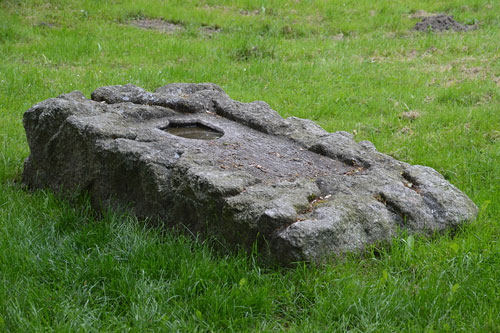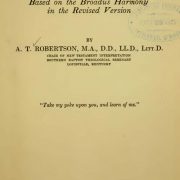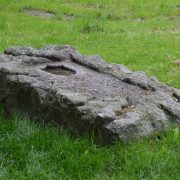Put It On
/0 Comments/in Colossians, Weekly Devotional/by David GuzikAnd have put on the new man who is renewed in knowledge according to the image of Him who created him, where there is neither Greek nor Jew, circumcised nor uncircumcised, barbarian, Scythian, slave nor free, but Christ is all and in all. (Colossians 3:10-11)
In the previous few verses Paul told Christians about things to put off – the ungodly and sinful conduct that marked our old life. We were supposed to put those things off like an old, stained, ruined suit of clothes.
But putting off is incomplete without putting on. That’s why Paul told us, “put on the new man.” Again, the phrase Paul used was commonly used for changing a set of clothes. We can almost picture a person taking off the old and putting on the new man in Jesus. So when we put on the “suit” of the new man, what does he look like?

First, the new man is renewed in knowledge. This means the new man is hungry to know what God says in His Word.
Next, the new man is according to the image of Him who created him. Paul clearly had in mind Genesis 1:27, where it is said that God created Adam in His own image. Nevertheless, now the first Adam is regarded as the old man who should be put off and discarded, because now we are created after the image of the second Adam, Jesus Christ.
Because everyone in the family of God is a new man (or woman) according to the image of Him who created him, then in a sense we are all the same. That’s why Paul wrote, there is neither Greek nor Jew, circumcised nor uncircumcised, barbarian, Scythian, slave nor free. The new man is part of a family, which favors no race, nationality, class, culture or ethnicity. It only favors Jesus, because in this new family, Christ is all and in all.
The wonderful truth is that this work of the new creation not only deals with the old man and gives us the new man patterned after Jesus Christ; it also breaks down the barriers that separate people in society. Among new creation people it doesn’t matter if one is Greek or Jew or circumcised or uncircumcised or a Scythian or a slave or a free man. All those barriers are broken down.
All of these were strong barriers in the ancient Roman world; and the power of God through the Gospel of Jesus Christ broke them all down. In that, Christianity brought something truly wonderful into the world—as new men and new women, we all belong to the same family.
We could say it is a four-step process:
- By faith in Jesus, put off the old man with the image of rebellious Adam.
- By faith in Jesus, put on the new man with the image of obedient Jesus.
- Renew yourself in knowledge by reading and thinking about God’s word.
- Consciously live as part of the “new man family.”
Doing those four things could make this the best week you’ve had in a long time!
Vergangenheit und Gegenwart
/0 Comments/in Wöchentliche Andacht/by David GuzikTötet daher eure Glieder, die auf Erden sind: Unzucht, Unreinheit, Leidenschaft, böse Lust und die Habsucht, die Götzendienst ist; um dieser Dinge willen kommt der Zorn Gottes über die Söhne des Ungehorsams; unter ihnen seid auch ihr einst gewandelt, als ihr in diesen Dingen lebtet. (Kolosser 3,5-7)
In Kolosser 3,1-4 hat Paulus uns erzählt, dass Jesus Christus für den Christen nun das Leben ist, und dass wir mit Jesus auferweckt und mit Ihm zur Rechten Gottes sitzen. Im Lichte dessen sagt er den Gläubigen, dass wir unsere Glieder töten sollen, die die Dinge unseres Lebens darstellen und die unserer Identität in Jesus widersprechen.

Wir töten diese Dinge, indem wir sie ablehnen und sie für uns als tot erachten und uns als tot für sie. Wenn wir einem lustvollen Appetit nachgeben, geben wir ihm die Nahrung, die diesen weiter wachsen lässt. Wenn wir gottlose, sinnliche Begierden für tot erachten, geben wir ihnen keine Macht, unser Leben zu beeinflussen.
Dann listet Paulus viele spezifische Sünden auf, denen wir sterben sollen. Es ist wichtig, dass Paulus diese Sünden auflistet und benennt. Wir müssen uns ganz individuell mit solchen Gewohnheiten und Versuchungen befassen.
Paulus beginnt mit den sexuellen Sünden: Unzucht, Unreinheit, Leidenschaft und böse Lust. Sex ist ein wunderbares Geschenk von Gott, aber es wird oft verdorben und pervertiert. Christen müssen Jesus als Herrn über ihr ganzes Leben anerkennen, inklusive ihrer Sexualität.
Doch es sind nicht nur die sexuellen Sünden mit denen die Christen umgehen müssen. Paulus nennt auch die Habsucht. Der Wunsch nach immer mehr ist einfach, aber es ist nichts anderes als Götzendienst.
Campbell Morgan nennt drei Wege, wo Habsucht furchtbar zerstörerisch ist:
- „Erstens ist es Götzendienst, bei dem der Mensch nur daran denkt, dass das Leben aus den Dingen besteht, die man besitzt und nicht in der richtigen Beziehung zu Gott“
- „Es ist auch eine Sünde gegen andere, denn um seine Begierden zu stillen, wird anderen Unrecht getan“
- „Und schließlich ist es selbstzerstörerisch, denn diese falschen Gedanken und Handlungen haben einen direkten Einfluß auf die Seele zu ihrem eigenen Verderben.“
Die aufgeführten Sünden sind Teil davon, wie diese Welt lebt und nicht wie Jesus lebte. Jeder Christ muss sich die Frage stellen: „Mit wem identifiziere ich mich? Mit der Welt oder mit Jesus? Denk daran: Wir werden mit Jesus Christus offenbar werden (Kolosser 3,4). Da Jesus niemals eine dieser Sünden begehen würde, tun wir das auch nicht.
Paulus hat erkannt, dass diese Sünden uns alle betrafen: unter ihnen seid auch ihr einst gewandelt. Diese Sünden beschreiben eine Welt der Rebellion gegen Gott und Gottes Zorn gegen sie, aber für den Christen sind sie Vergangenheit.
Paulus sagt, dass Christen einst in diesen Sünden wandelten. Es ist möglich – wenn auch tragisch – dass diese Sünden im Leben eines Christen hin und wieder vorkommen, aber sie dürfen nicht das Leben eines Christen kennzeichnen. Einfach gesagt: ein Christ sollte nicht wie die Söhne des Ungehorsams leben. Ein wahrer Christ kann sich nicht in gewohnheitsmäßiger Sünde wohlfühlen.
Glaube es: Als Jünger Jesu sind diese Sünden für dich Vergangenheit, und deine Gegenwart ist das Leben in Jesus Christus.
Put It Off
/6 Comments/in Colossians, Weekly Devotional/by David GuzikBut now you yourselves are to put off all these: anger, wrath, malice, blasphemy, filthy language out of your mouth. Do not lie to one another, since you have put off the old man with his deeds (Colossians 3:8-9)
In the previous verses Paul wrote to Christians about the kind of sins they should give up and consider themselves dead to. Paul wrote about sins we normally consider notorious—sexual sins and greed. Here we see that Paul thought we should be concerned with more than notorious sins; we should be concerned with all sins, even what we might think of as “lesser” sins.

That’s why Paul wrote, now you yourselves are to put off all these. The sins Paul here listed (anger, wrath, and so forth) are regarded by many as “little” sins that Christians may overlook with little danger. God challenges us to put off the old man in every area of our lives.
The phrase put off is exactly that which would be used for taking of a suit of clothes. It’s as if Paul meant, “Now that you belong to Jesus, even these sins don’t fit you any more. Take them off like you would an old, dirty, bad-fitting suit of clothes.”
Take a good look at the sins listed here: anger, wrath, malice, blasphemy, filthy language and speaking the lie. Each of these sins are primarily committed by what we say. When Paul called the believer to a deeper obedience, he told us to bridle our tongue, as did James in James 1:26 and 3:1-9.
The other thing to notice about this list is it has to do with sins we commit as we relate to each other. We get angry with others, we harbor malice towards others, and we lie to each other. So as Paul listed sins in Colossians 3:5-9, he showed two high priorities in Christian living: sexual morality connected with a right attitude towards material things, and simply getting along in love with one another.
It is easy for a Christian community to compromise one for the other, but Paul (by inspiration of the Holy Spirit) insisted that they both have a high place in the Christian life.
You have put off the old man with his deeds means that in Jesus Christ, the saints of God are different people. Therefore, when we feel tempted to immorality or anger, we should regard it as an unwelcome intruder that has no right to stay. The real you is the new man; the old man is put off.
Christus, unser Leben
/0 Comments/in Wöchentliche Andacht/by David GuzikTrachtet nach dem, was droben ist, nicht nach dem, was auf Erden ist; denn ihr seid gestorben, und euer Leben ist verborgen mit dem Christus in Gott. Wenn der Christus, unser Leben, offenbar werden wird, dann werdet auch ihr offenbar werden in Herrlichkeit. (Kolosser 3,2-4)
Paulus sprach zu jedem Christen, wenn er davon spricht, dass wir nach dem, was droben ist trachten sollen. Man kann nach den Dingen hier unten oder nach denen, die droben sind, trachten. Vergiß nie, dass das beste Leben ein solches ist, das auf die Dinge des Himmels fixiert ist. Ein solches Leben ist verborgen mit dem Christus in Gott, und weil Jesus auf dem Thron im Himmel sitzt, sind auch unsere Gedanken und Herzen mit dem Himmel verbunden.

Wir müssen in unsere Liebe zu den himmlischen Dingen wachsen. Denke an Dinge, die zum Himmel gehören:
– Gott in Seiner dreifaltigen Natur – Vater, Sohn und Heiliger Geist
– Glaube, Hoffnung und Liebe
– Gottes ewiges Wort
– Gottes Kinder
Wende deine Aufmerksamkeit diesen Dingen zu. Früher hast du deine Aufmerksamkeit den Dingen auf der Erde geschenkt. Du sollst diese irdischen Dinge nicht ignorieren; man sollte nie glauben, dass alle Dinge dieser Welt böse sind – das sind sie nicht. Doch trachtet nicht nach dem, was auf Erden ist. Gott hat dich für mehr als nur die Erde erschaffen und erlöst, nämlich letztendlich für den Himmel.
Als Jesus in dein Leben kam, hat Gott dich so gesehen, als ob du mit Jesus am Kreuz gestorben bist. Nun ist dein Leben verborgen mit dem Christus in Gott. Es ist verborgen, also nicht offensichtlich für andere. Es ist verborgen, also sicher in Jesus.
Das ist eine Tatsache für diejenigen, die von sich sagen: „Christus, unser Leben.“ Bemerke, dass Paulus hier „unser“ schreibt – das heißt, dass das für uns alle gilt. Nicht nur für die Apostel oder einige Super- Christen, sondern für alle Gläubige. Manchmal sagen wir: „Musik ist sein Leben“ oder „Sport ist sein Leben“ oder „er lebt für seine Arbeit“. Von einem Christen sollte man sagen: „Christus ist sein Leben.“
Die wundervolle Verheißung ist, dass wenn der Christus, unser Leben, offenbar werden wird, dann werdet auch ihr mit ihm offenbar werden in Herrlichkeit. Denk darüber nach: die Verheißung von Jesu Wiederkehr ist nicht nur, dass wir Seine Herrlichkeit sehen werden, sondern dass auch wir mit ihm offenbar werden in Herrlichkeit. Das ist die Offenbarung der Söhne Gottes, von der in Römer 8,19 die Rede ist.
An diesem Tag werden alle die Heiligen Gottes so sehen, wie sie wirklich sind, nicht wie sie in dieser Welt nur zu sein scheinen. Die Welt hat Paulus nie so gesehen, wie er wirklich war. Die Christen im antiken Kolossä haben vielleicht nie gesehen oder verstanden, wer sie wirklich in Jesus waren, aber eines Tages wird es offenbar. Dasselbe gilt für dich als Gläubigen in Jesus Christus. Das Kommen Jesu wird offenbaren, wer du in Herrlichkeit bist.
Past and Present
/0 Comments/in Colossians, Weekly Devotional/by David GuzikTherefore put to death your members which are on the earth: fornication, uncleanness, passion, evil desire, and covetousness, which is idolatry. Because of these things the wrath of God is coming upon the sons of disobedience, in which you yourselves once walked when you lived in them. (Colossians 3:5-7)
In Colossians 3:1-4 Paul told us that for the Christian, Jesus Christ is now their life and we are identified with the risen and enthroned Jesus. In light of that, he told believers that we must put to death the things in our life that are contrary to our identity with Jesus.

We put these things to death in the sense of denying them, and considering them dead to us and us dead to them. When we gratify a sensual appetite we give that appetite the food and nourishment that makes it thrive. When treat ungodly, sensual desires as if they were dead, we deny them strength to influence our life.
Paul then listed many specific sins that we are to die to. It was important to list and name these sins as Paul did. We need to specifically and individually deal with such areas of habit and temptation.
Paul began by describing sexual sins: Fornication, uncleanness, passion and evil desire. Sex is a wonderful gift from God, but is easily and often corrupted and perverted. Christians need to recognize Jesus as Lord over all their life, including their sexuality.
Yet, it isn’t that the only sins Christian are concerned with have to do with sex. Paul went on to also name covetousness. That desire for more and more is simple, but it is nothing less than idolatry.
G. Campbell Morgan listed three ways that covetousness is terribly destructive:
– “First, it is idolatry, in that it only obtains when man thinks of life consisting in things possessed, rather than in righteous relationship to God.”
– “It is also a sin against others, for to satisfy the desire, others are wronged.”
– “Finally, it is self-destructive, for these wrong conceptions and activities always react upon the soul to its own undoing.”
The sins mentioned previously are part of the way the world lives and not the way Jesus lived. Every Christian is faced with a question: “Who will I identify with, the world or with Jesus?” Remember: We are identified with Jesus Christ (Colossians 3:4). Since there is no way that Jesus would walk in any of these sins, we won’t walk in them either.
Paul recognized that these sins used to characterize us all: in which you yourselves once walked when you lived in them. These sins may mark a world in rebellion against God and destined for His wrath, but they are in the past tense for the Christian.
Paul says that Christians once walked in these sins. It is possible – though tragic – that these sins should occasionally mark a Christian’s life, but they must not be a Christian’s walk, their manner of living. Simply put, the Christian should not live like the sons of disobedience. A true Christian can not be comfortable in habitual sin.
Believe it today: As a disciple of Jesus, these sins are your past, and your present is life in Jesus Christ.
Mit Christus auferweckt
/0 Comments/in Wöchentliche Andacht/by David GuzikWenn ihr nun mit Christus auferweckt worden seid, so sucht das, was droben ist, wo der Christus ist, sitzend zur Rechten Gottes. (Kolosser 3,1)
Wenn man mit den Briefen des Apostel Paulus vertraut ist, erkennt man hier in Kolosser 3,1 einen bekannten Übergang. In den Kapiteln 1 und 2 schrieb Paulus über alles, was Jesus für uns getan hat. Erst nachdem er diese Grundlagen dargestellt hat, beginnt Paulus darüber zu schreiben, wie wir unser christliches Leben praktisch führen sollen.
Hier fängt Paulus nun damit an, das praktische christliche Leben zu beschreiben, und zwar mit dem klaren Verständnis, dass das praktische christliche Leben auf der Grundlage theologischer Wahrheit aufgebaut ist. Dieser Gedanke kommt in Kolosser 3,1 stark zum Ausdruck: weil wir wissen, dass Jesus wirklich von den Toten auferweckt wurde, wird unsere Identifikation mit Ihm echt. Nur weil wir mit Christus auferweckt sind, können wir das suchen, was droben ist.

Der Gedanke, dass wir mit Christus auferweckt sind, kam schon einmal in Kolosser 2,12 vor, wo Paulus die Taufe gebraucht um diese geistliche Realität zu illustrieren: Nun, da wir mit Christus auferweckt sind, müssen wir uns auch dem angemessen verhalten. In den letzten Versen von Kolosser 2 erinnert uns Paulus daran, dass die Gesetzlichkeit uns nicht dabei hilft, richtig vor Gott zu leben. Nun zeigt uns Paulus, was uns dabei hilft: ein Leben in der Identifikation mit dem auferweckten Jesus.
Weil wir mit Christus auferweckt sind, sollten wir genauso handeln, wie Jesus es nach Seiner Auferstehung tat.
Nach Seiner Auferstehung verließ Jesus das Grab. Das sollten wir auch tun – wir leben nicht länger im Grab unseres alten Lebens.
Nach Seiner Auferstehung verbrachte Jesus Seine Zeit mit Seinen Jüngern und diente ihnen. Das sollten wir auch tun – wir leben unser Leben, um mit anderen zusammen zu sein und einander zu dienen.
Nach Seiner Auferstehung lebte Jesus mit einer übernatürlichen Kraft und konnte unmögliche Dinge tun. Das sollten wir auch tun – wir leben mit der Kraft und Befähigung des Heiligen Geistes.
Nach Seiner Auferstehung freute Jesus sich auf den Himmel und wusste, dass Er schon bald dorthin gehen würde. Das sollten wir auch tun – wir sollten jederzeit wissen, dass unsere Heimat im Himmel ist.
Um es nochmal zu betonen fügt Paulus noch diesen Satz hinzu: sitzend zur Rechten Gottes. Dies ist ein Ort des Sieges und des Friedens. Das ist dein Platz in Christus Du bist mit Christus auferweckt; du sitzt mit Ihm zu Rechten Gottes. Nun lebe danach!








